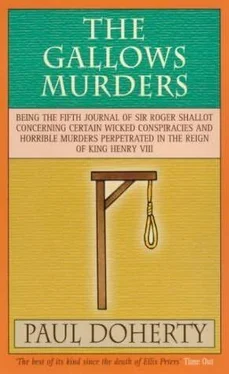Paul Doherty - The Gallows Murders
Здесь есть возможность читать онлайн «Paul Doherty - The Gallows Murders» весь текст электронной книги совершенно бесплатно (целиком полную версию без сокращений). В некоторых случаях можно слушать аудио, скачать через торрент в формате fb2 и присутствует краткое содержание. Жанр: Исторический детектив, на английском языке. Описание произведения, (предисловие) а так же отзывы посетителей доступны на портале библиотеки ЛибКат.
- Название:The Gallows Murders
- Автор:
- Жанр:
- Год:неизвестен
- ISBN:нет данных
- Рейтинг книги:4 / 5. Голосов: 1
-
Избранное:Добавить в избранное
- Отзывы:
-
Ваша оценка:
- 80
- 1
- 2
- 3
- 4
- 5
The Gallows Murders: краткое содержание, описание и аннотация
Предлагаем к чтению аннотацию, описание, краткое содержание или предисловие (зависит от того, что написал сам автор книги «The Gallows Murders»). Если вы не нашли необходимую информацию о книге — напишите в комментариях, мы постараемся отыскать её.
The Gallows Murders — читать онлайн бесплатно полную книгу (весь текст) целиком
Ниже представлен текст книги, разбитый по страницам. Система сохранения места последней прочитанной страницы, позволяет с удобством читать онлайн бесплатно книгу «The Gallows Murders», без необходимости каждый раз заново искать на чём Вы остановились. Поставьте закладку, и сможете в любой момент перейти на страницу, на которой закончили чтение.
Интервал:
Закладка:
'It should be nonsense,' Benjamin declared slowly. 'On April the ninth, 1483, Edward the Fourth died here on the Thames whilst fishing.' He smiled and shrugged. 'Well, at least he collapsed and was taken back to one of his palaces, where he died. Now he left two sons: Edward, eleven years old, and Richard aged seven. The protectorate went to their uncle, Richard, Duke of York but, as you know, Richard usurped the throne and imprisoned his nephews in the Tower, from where they later disappeared. Two years later, in August 1485, Richard the Third was defeated and killed at Market Bosworth by the present King's father. Now all the evidence indicates that the two boy Princes were either poisoned or killed: their bodies were buried in the Tower or tied with sacks, loaded with stones, and dumped into the Thames.' Benjamin tapped the letter with his fingers. 'According to this, however, young Prince Edward survived. He possesses his own seals and is now threatening our King.'
'But it's blackmail,' I said slowly. 'Idle threats to obtain gold.'
'It may well be,' Agrippa replied, 'but listen awhile, Roger.' He leaned forward to emphasise his points. ‘First, Edward is supposed to have died forty years ago. True?' I nodded.
'Secondly, when a king dies – and remember, Richard the Third didn't even allow Edward to be crowned – his seals are collected together and smashed. Richard the Third would certainly make sure those of his imprisoned nephew, the few that were made, would be thrown into a fire. If he didn't, Henry Tudor, our present King's father, certainly would.'
'So, where did these two seals come from?' I asked. 'Couldn't they have been removed from some letter or proclamation?'
Agrippa shook his head. 'No, they are freshly affixed. According to the lettering and insignia they are no forgery.' 'But how are they dangerous?'
Agrippa smiled and shook his head. 'Roger, Roger, examine the letter carefully. Our present King, Henry the Eighth, God bless him, is the son of a usurper. He will not tolerate anyone with Yorkist blood in their veins.'
(Agrippa was right. In his reign, Henry VIII systematically, through a series of judicial executions, wiped out anyone who had Yorkist blood or a better claim to the throne than he. Edmund Stafford, Duke of Buckingham, was one, whilst the de la Pole family, except for Cardinal Reginald who fled abroad, all saw the inside of the Tower. On this matter, Henry was as mad as a March hare.)
Agrippa thrust the seals of the proclamation under my nose. 'Can you imagine, Roger, what happened when Henry saw this? He ranted for days. No one dared go near him. Not even Benjamin's dearest uncle. Henry was like an enraged bull: smashing furniture, issuing threats, cursing and kicking anyone who came near him.'
Oh yes, I thought, that's the Great Beast! He's all sweetness and smiles when he is getting his own way. Yet, once he's threatened and thwarted, he's more dangerous than a madman out of Bedlam. (When he grew older, and the ulcer on his leg began to weep pus, and his great fat, gout-ridden body was wracked by pain, you could find yourself in the shadow of the axe just by sneezing in his presence.) 'But the King didn't believe it?' I asked.
'Oh yes, he did,' Benjamin replied. 'Remember, Roger, Edward and his brother Richard may have disappeared, but no one truly knows what happened to them. Even a hint, a faint suspicion that they might still be alive would send Henry into a paroxysm of rage. Moreover, the writer touched a raw nerve. The King is as superstitious as any country yokel. He really does believe that he has no son because of Divine displeasure.' ‘But the people wouldn't believe it,' I retorted. Wouldn't they?' Agrippa asked.
He was about to continue, but the oarsmen shouted as they lifted the oars. We were now approaching London Bridge, being swept through the narrow arches by the gushing water. A chilling but exciting experience. I have made that journey many a time. Once the oars go up and the boat is left to the fury of the water, your heart drops and your stomach lurches.
Once we were into calmer waters, Agrippa continued. 'Can you imagine what would happen if such a proclamation was posted in a London now plagued by the sweating sickness? People would begin to wonder and gossip. And the whisper would turn to chatter and, as it does, fable would become fact: the King must be cursed.'
I leaned against the side of the boat and stared into the water. Agrippa spoke the truth. I had seen the sickness in London. I had experienced all the pain and the horror. I'd witnessed the hysteria and knew the anger bubbling beneath the surface. The people would want an answer, and Henry VIII would become their scapegoat. 'Did he send the gold?' I asked.
'Of course not,' Agrippa replied. 'Instead he ringed St Paul's with troops and had the great cross in the churchyard heavily guarded by archers and men-at-arms.' 'And?' I asked.
'Oh, no proclamation was posted there. The villain behind this was too astute. Instead the proclamation appeared on the door of St Mary Le Bow, another on the cross outside Westminster Abbey. Both carried the seal of Edward V. Both proclaimed Henry to be a usurper, deriding his lack of a son and the sickness raging in London as a sign of God's displeasure. The proclamations were torn down but the whispering has begun.' Agrippa hawked and spat into the river. 'And now another letter has arrived. This time the demand is for two thousand in gold as a punishment. The money is to be delivered in six days' time, on the feast of St Augustine, the twenty-eighth of August: two leather bags in a steel coffer are to be placed near St Paul's Cross as the cathedral bells toll for the midday Angelus.' 'And the letter was dispatched from the Tower?' ‘Yes,' Benjamin replied. 'It's almost as if, for the last forty years, this forgotten prince has been sheltering in some secret room in the Tower-' 'But you say arrived?' I interrupted. 'Arrived where?'
The first one was delivered to the constable of the Tower, Sir Edward Kemble. The second was left in the Abbot's stall in Westminster Abbey.'
'Which explains why we are going to the Tower now?' I asked.
'Ah.' Agrippa pulled his black cloak around him as if the river breeze was cold.
(That's one thing I noticed about Agrippa. He never liked the sunlight. Like some dark spider, he preferred the shadows. I never saw him eat or drink. Oh, he'd raise a cup to his lips, as he did in the garden at Charterhouse, but nothing ever seemed to pass his lips. He always seemed cold, too.) Agrippa pointed to a sandbank in the river on which stood a massive, three-branched gibbet bearing the rotting corpses of river pirates.
The Tower is full of curiosities,' he murmured. 'A month ago the chief executioner's deputy, Andrew Undershaft, was, somehow, put in a cage at Smithfield and roasted alive over a roaring fire.'
‘I was there,' I exclaimed. Well, I saw his blackened corpse and helped remove it from the cage… What's that got to do with these letters?'
'Perhaps nothing,' Benjamin replied. 'Undershaft died in Smithfield, God knows how. He was seen, the previous day, drinking in a tavern near Cock Lane, and then he disappeared. How anyone could take a burly man such as him, put him in a cage and roast him to death is a mystery. Now the city authorities thought it was revenge carried out by the friends or relatives of a man Undershaft may have executed. However, ten days ago, another member of the Guild of Executioners, Hellbane, was fished from the Thames. According to the surgeon who examined the corpse, Hellbane had been alive when he had been put in the sack. No mark or wound was found upon his corpse, but weights had been attached to his feet. You see, Roger, that's the mystery; two members of the Guild of Executioners suffered judicial murder. They were not knifed or clubbed to death. They were both killed in a way prescribed by law for certain felons. Undershaft died the death of a poisoner; Hellbane suffered the fate of a patricide, someone who has killed his father.' 'And they were innocent?' Benjamin shrugged. 'As far as we know.'
Читать дальшеИнтервал:
Закладка:
Похожие книги на «The Gallows Murders»
Представляем Вашему вниманию похожие книги на «The Gallows Murders» списком для выбора. Мы отобрали схожую по названию и смыслу литературу в надежде предоставить читателям больше вариантов отыскать новые, интересные, ещё непрочитанные произведения.
Обсуждение, отзывы о книге «The Gallows Murders» и просто собственные мнения читателей. Оставьте ваши комментарии, напишите, что Вы думаете о произведении, его смысле или главных героях. Укажите что конкретно понравилось, а что нет, и почему Вы так считаете.












